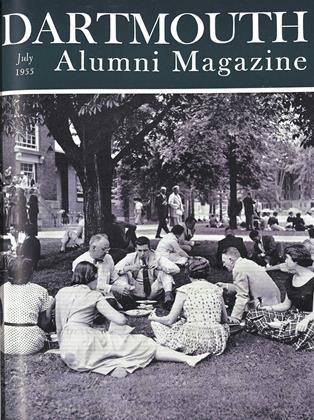By Harold J. Berman '38 andMiroslav Kernev. Cambridge: Harvard University Press, 1955. 208 pp. $4.00.
Harold Berman, Professor of Law at Harvard and well-known for his previous works on Soviet law, in collaboration with Miroslav Kerner, former Czech lawyer who served in Russia during World War II, has produced an exhaustive, objective piece of research, of value to those interested in Soviet law, the Soviet armed forces, and the Soviet political system in general.
At a time when much speculation is rife as to the role of the army in Soviet politics, it is interesting to note the authors' conclusion that the army, although enjoying considerable administrative autonomy and thus limiting the totalitarian system, does not stand as a separate power structure capable of playing an independent political role or of threatening the party or the state security system. From their analysis of Soviet military administration t hey conclude that "the interweaving of military, Party, and police controls makes it difficult to diagnose Soviet politics in terms of simple conflicts between the various organizations" (p. 134).
For those accustomed to view Soviet Russia as an unrestricted police state, it will come as a surprise to read the authors' premise that Soviet military justice "in peacetime permits a high degree of protection of the rights of the accused, with the explicit exception of political offenders" (p. 3). In this as in other spheres of Soviet justice, the leadership seeks to "run law and terror in double harness," by providing both for swift and arbitrary punishments by the MVD, and even by the courts, in respect of political offenses, and for the less capricious and less unjust procedures of the courts, in other cases.
Unlike other countries, the Soviet system of military courts is independent of the military command and closely integrated with the structure of courts and the procuracy as a whole. Thus a special section of the criminal code is devoted to military crimes; review of decisions of military courts is in the hands of the Supreme Court of the U.S.S.R.: military procurators are directly under the control of the Procurator General of the U.S.S.R. At the same time, in a manner familiar to most armies, certain military offenses are punishable by disciplinary action of superior officers, as established in a Disciplinary Code. The current Disciplinary Code is permeated with such concepts as strictest discipline, patriotism, personal responsibility and differentiation of ranks. Through this, and the parallel and separate military courts for more serious offenses, the Soviet regiment seeks the twin essentials of any army - discipline and justice, in a system which combines "due process" with terror, extreme severity with elements of leniency, the degree of each depending on the individual case and the situation.
 View Full Issue
View Full Issue
More From This Issue
-
 Feature
FeatureADMINISTRATIVE CHANGES
July 1955 -
 Feature
FeatureAlumni Fund Tops $760,000
July 1955 -
 Feature
FeaturePresident Eisenhower Visits the Grant
July 1955 -
 Class Notes
Class Notes1930's History-Making 25th
July 1955 By RICHARD W. BOWLEN '30 -
 Article
ArticleThe 1955 Commencement
July 1955 By FRANK PEMBERTON -
 Class Notes
Class Notes1934's Happy 21 st
July 1955 By HENRY WERNER '34
H. GORDON SKILLING
Books
-
 Books
BooksSEX IN CHILDHOOD
February 1934 By C. N. Allen -
 Books
BooksSOLDIERS AND SCHOLARS: Military Education and National Policy
March 1957 By DONALD H. MORRISON -
 Books
BooksPOLITICAL WRITERS OF THE EIGHT-EENTH-CENTURY.
MAY 1964 By JOHN HURD '21 -
 Books
BooksTHE NOVELS OF JANE AUSTEN: AN INTERPRETATION.
March 1974 By KATHERINE LEVER -
 Books
BooksADVENTURES IN WORLD LITERATURE.
June 1937 By Stearns Morse -
 Books
BooksCATHOLIC VIEWPOINT ON CHURCH AND STATE.
December 1960 By T.S.K. SCOTT-CRAIG


